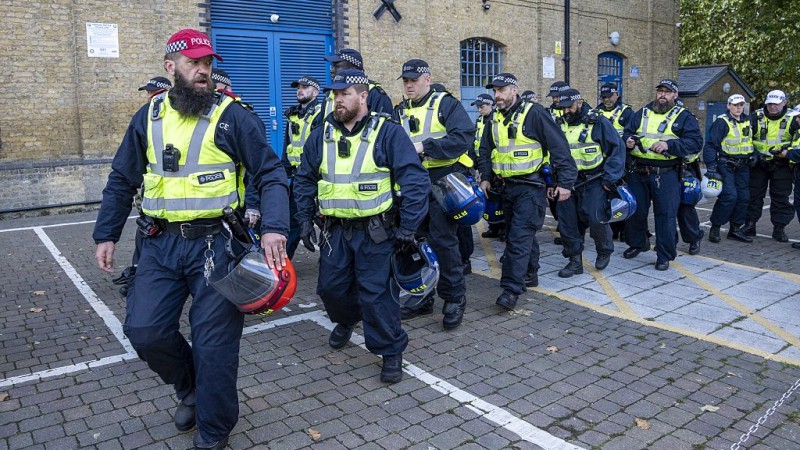 Image Credit: toondelamour / Getty
Image Credit: toondelamour / Getty In our Brave New World, whereas the government grants itself carte blanche to surveil its subjects — often in defiance of basic Fourth Amendment protections — its subjects will no longer be permitted to surveil, in precisely the same way, even property they theoretically own — because racism.
“Cameras for me, but not for thee”: the ethos of the parasitical ruling class.
As I covered earlier today elsewhere, the diverse mayor of Charlotte, Vi Lyles, lavished praise on her media “partners” that declined to show the damning image of the public transit stabbing of a defenseless 23-year-old woman from behind by a gargantuan African-American goon with 14 prior arrests for violent crime.
Her excuse for her censorship advocacy, of course, was “respect for Iryna’s family.”
But one look at the still image of the knife in the hands of the thug, waiting to be plunged into the girl’s throat, and we all know the true motivation.
Related: BLMers Launch GoFundMe For Subway Stabber, Charlotte Mayor Urges Video Censorship
As reported by CHCH-TV, a Canadian man recently received an order from the city of Hamilton to remove a series of private cameras on his property, mounted to thwart criminality.
Via CHCH-TV (emphasis added):
“A local Hamilton man has been ordered by the city to take down his security cameras that he has on the outside of his house, despite his claim that his footage has been useful in crime investigations.
Dan Myles says he has 10 security cameras outside his home on MacNab Street North in downtown Hamilton, and he says he needs them.
“Because we had a lot of break and enters into our home and homes around us,” said Myles.
Myles has posted videos of break-ins online.
He also says police have asked him for his videos over the years to help with investigations.
CHCH News reached out to Hamilton police, and they say they can’t confirm the use of Myles’ videos, but said they often work with homeowners, businesses and drivers to get footage…
But last week, Myles received an order to comply with the City of Hamilton’s fortification by-law, which asked him to remove his cameras.
The by-law says homeowners are not permitted to view or listen beyond the perimeters of their own property.
“I got a notice from by-law and I thought ‘how could this be’,” said Myles. “Everybody has Ring doorbells pointed at the street, and my neighbours have cameras pointed at my house, and we all point cameras at each other.””
In this case, the city offered no explanation for the order.
However, Canadian state media has decried the general racism allegedly promulgated by recording minorities committing crime.
Via CBC (emphasis added):
“The Ring doorbell camera is sold as a great way to monitor who’s at the door, whether you’re home or not. But preying on consumers’ fears of having their package deliveries stolen, or worse, is having far-reaching impacts on communities and policing practices around the world.
Director Brett Gaylor meets community activists in Skid Row, Los Angeles, where law enforcement has partnered with Amazon’s Ring, with some unintended consequences. On a map, obtained from the police, the activists notice that ‘hot spots’ where police predict crimes will occur is based on users’ ‘reports of suspicision’ are often not found in the heart of Skid Row, but on the outskirts, where gentrifying communities live closest totheir less fortunate, often non-white neighbours. “The map was really a gate,” says Pete White of the StopLAPD Spying Coalition, “(it) wasn’t (for) the protection of people inside Skid Row, it was making sure that the people inside Skid Row were unable to travel outside of its boundaries.””
Related: Denver Councilwoman Floats Whites-Only Business Tax
Similarly, an app relying on Ring footage called Neighbors, which allows citizens to share intel on crimes committed in their neighborhoods, is allegedly racist because they catch DEI people acting anti-socially, which “reflects people’s biases about marginalized people” and which obviously cannot be allowed.
Via CBS (emphasis added):
“In May 2019, the El Monte Police Department in California began a partnership with Ring, the Amazon-owned company best known for its motion sensor video doorbells and home security cameras. Ring cameras can be linked to its crime-sharing social media app called Neighbors. Police Chief David Reynoso explained, “If someone has a Ring camera, they download the software and then they choose to be part of the El Monte Police Department Neighbors Portal, then not only can the police department see it, but every other neighbor who’s part of that portal gets to see it also.”
The Neighbors Portal is an extension of the Neighbors app that allows police officers to view and comment on public posts as verified law enforcement. Police departments can share information about crime and safety events. They can also ask for help on active investigations by creating a so-called “geofence” around a crime location and requesting video footage captured on home security cameras filmed at specific times…
But for many, the growing popularity of these digitized versions of neighborhood watch programs is cause for alarm.
In 2019, Motherboard individually reviewed more than 100 user-submitted posts in the Neighbors app over two months in the New York City area. They found that the majority of people reported as “suspicious” were people of color. Nextdoor, an app originally meant for communication between neighbors, also had its share of controversies with complaints about racial profiling by some using the app.
“These apps are dangerous because they not only reflect people’s biases about marginalized people, but these apps legitimize that bias as an effective guide for addressing crime,” wrote Myaisha Hayes, campaign director at Media Justice, a civil rights organization focused on equity in the digital age.
Hayes warns these apps are digitizing the same type of racial profiling associated with traditional neighborhood watch programs. “We know, given the murder of Trayvon Martin, that this bias can have life-threatening consequences for Black and brown people who may be passing through your neighborhood,” she wrote in a statement to CBS News.”
Benjamin Bartee, author of Broken English Teacher: Notes From Exile (now available in paperback), is an independent Bangkok-based American journalist with opposable thumbs.
Follow AP on X.
Subscribe (for free) to Armageddon Prose and its dystopian sister, Armageddon Safari.
Support AP’s independent journalism with a one-off, hassle-free “digital coffee” tip.
Bitcoin public address: bc1qvq4hgnx3eu09e0m2kk5uanxnm8ljfmpefwhawv


